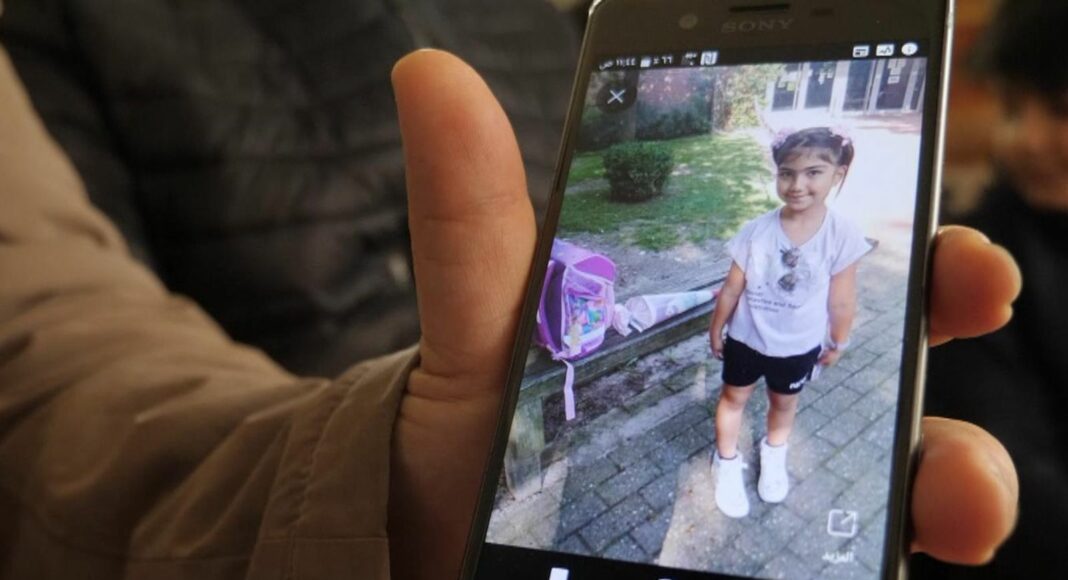Mohammed looks at me, his eyes wet from tears, and shakes his head gently. Grief is like a weight around him, which he meets with forced smiles and choked-back tears.
“Every day, I think of dying a hundred times,” he says.
Next to him is his wife, Nour, heavily pregnant and sobbing into her hands. She is due to give birth in just a couple of weeks, but now mourns her daughter just as she awaits the arrival of a son.
It is less than a week since Rula drowned in a French canal, and the devastation is still desperately etched on their faces.
Nour unlocks her phone and calls up a photo of Rula. She is smiling out from the screen.
“She was beautiful and I lost her. My little princess. She was seven years old, she had seen nothing in this world. We just wanted to make their lives better,” she says.
Rula died because of the family’s dream of reaching Britain. They had spent years travelling from Iraq, where their lives were threatened, across Europe, to Germany and then on to France.
Image:
Nour and her family had spent years travelling from Iraq, where their lives were threatened
A few days ago, the family boarded a boat in France, intent on reaching Britain. They had paid a people smuggler €6,000, and been promised seats aboard the sort of vessel used for tourist trips – safe and reliable.
Instead, they were placed on a death-trap – an overloaded stolen pleasure-boat with no life jackets that capsized on a canal. Rula, who had sought refuge from the noise in a small cabin at the front of the boat, was trapped inside.
“The water came into the cabin and she was stuck,” says Mohammed.
“The smugglers had left us. I had to rescue my wife, my son and another person. But I couldn’t rescue her.”
They are too tired to shout or become furious. But if you ask them about blame, then the answer comes back.
“My daughter died and the reason why is because of the people smugglers who have no morals,” he says.
“They fooled us, took money from us and threw us in the water without any mercy. They do not see humans as humans – they only see materials and money.”
Image:
Muhaimen pays his respects at his sister’s funeral
0:58
Rula’s death poses tough question for politicians
Besides them are their three sons – Muhaimen, 14, Hassan, 10, and Moamel, eight. They listen and nod along quietly.
“She was very dear to us, but what do we do?” says Hassan, when I ask him about his sister.
“I want her to come back but she won’t.” His grief is so thick it bewilders him.
The family invited us to talk to them. They wanted the world to know about their daughter, but they also wanted to talk about their exasperation with the life they’ve ended up living – fleeing a home where they cannot stay, but struggling to find a place where they can actually settle.
“I do not know what to do or where to go,” Nour says. “What crime have these children committed? What is their future? I need a country to listen to me, just take their papers.”
Mohammed nods and holds his wife. “When you reach a point when your life is not secure, when your children could get killed, you have no choice but to migrate and go to countries that preach humanity.
Image:
Rula’s father Mohammed speaks to Sky News
“But when you talk to them, tell them your story, they threaten you with deportation. Our children are smart but honestly, sometimes we wonder – why did we bring them into this world?”
I ask if they would still like to go to Britain, despite all the trauma they have experienced. The answer is yes. Remarkably, they plan on trying again.
A message comes through. The family has been asked to go to the morgue in Lille.
Mohammed comes in and out, a ball of nervous tension. Hassan and Moamel play with a paper aeroplane on a patch of lawn over the road from the morgue. They find a ladybird and agree that Rula would have loved it.
But then they are called back in, and they see her body, and when we see the boys next they are silent but for their weeping.
A short while later, Rula’s body is released to the family but there is little time to waste. Muslim tradition dictates that the burial must take place before sunrise.
When we get to the graveyard, there are dozens of people waiting – sympathetic strangers who’ve come to offer solace. You can see the family are touched.
At the far end, under the shadow of a tall electricity pylon but shaded from the traffic noise, Rula’s coffin is lowered into a grave.
Image:
Rula was buried during a small ceremony
There is a prayer, a moment of reflection, and then the grave is filled in. Her father and brothers all rub their hands in the soil. A bag is filled with the dirt and given to Nour. Flowers are placed over the grave, as well as photos of Rula. A marker is put in place, remembering her name. Hassan kisses it.
We say goodbye to the family, and one thing strikes me. If Mohammed, Nour and their children do eventually get to the UK, they will not be allowed to travel abroad again for a long time.
Reaching Britain will mean being cut off from their daughter’s final resting place, unable to lay flowers on Rula’s grave. Like so much in the story of migration, it is also a tale of making terrible choices.




